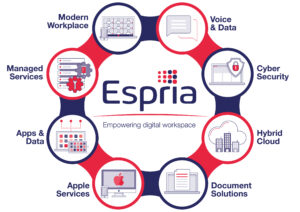As we all find ourselves working from home, we have been removed from our office environments and the IT security that that provides us.
Whilst your IT provider should ensure that you can access your systems in the office securely, probably through VPN, you will also probably have a need to print documents at home. You may need to proofread something and find that easier as a printed document or need to print a contract to sign and scan back. Either way, our homes have now become our offices, and we will be using our printers. Therefore, how can we now all print securely in our homes without the threat of having our valuable Business data stolen by hackers?
So, we have compiled some simple steps to help you keep your printing secure:
Most users have access to their printer portal via the internet if you enter the printers IP address. IN this portal you can monitor toner levels, look at the activity log and use the document scanning process. Encrypt the access to this portal, allowing password-protection and this will deny hackers to obtain the control they need, and this provides you with another line of defence in your home security.
So, check the specifications of your printer and ascertain what the hard drive is holding. If you are selling your printer, you will need to overwrite hard drive. The manufacturer of your printer should be able to give you directions on this. If you are disposing of the printer, then you need to ensure that the hard drive is overwritten and/or destroyed. Again, check with the manufacturers about how you responsibly dispose of the printer to minimise any potential security risks.
These tips should keep your home printer secure whilst we’re all working from home during these testing, strange times. Stay safe!
- Secure your home network
- Change your password and the administrator name if it is still on a default setting.
- The service set identifier should be modified
- Implement wireless encryption that is compatible for all your network devices connected.
- Secure the printer portal
Most users have access to their printer portal via the internet if you enter the printers IP address. IN this portal you can monitor toner levels, look at the activity log and use the document scanning process. Encrypt the access to this portal, allowing password-protection and this will deny hackers to obtain the control they need, and this provides you with another line of defence in your home security.
- Remove the printer hard drive>
So, check the specifications of your printer and ascertain what the hard drive is holding. If you are selling your printer, you will need to overwrite hard drive. The manufacturer of your printer should be able to give you directions on this. If you are disposing of the printer, then you need to ensure that the hard drive is overwritten and/or destroyed. Again, check with the manufacturers about how you responsibly dispose of the printer to minimise any potential security risks.
These tips should keep your home printer secure whilst we’re all working from home during these testing, strange times. Stay safe!
If your home printer is connected to your home network, it does pose as a potential security threat as hackers may be able to penetrate and access your business data through your home network.


